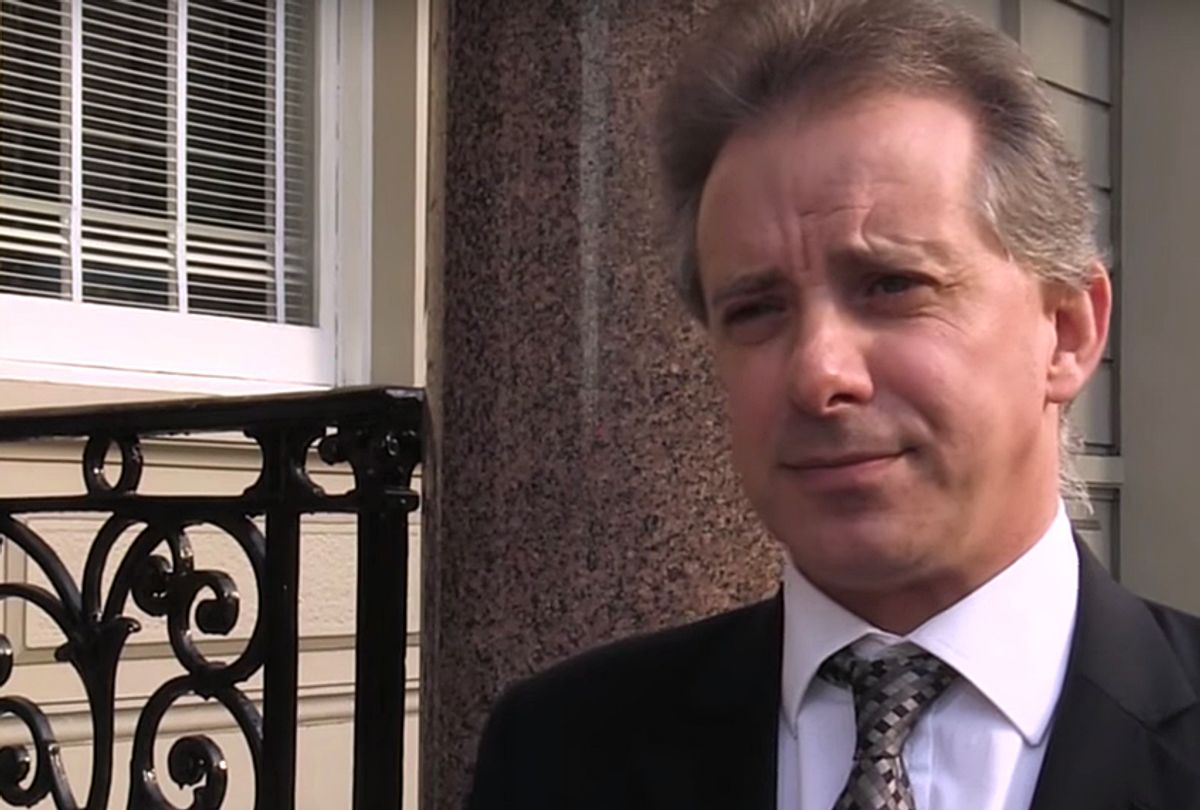Christopher Steele, the former British spy who produced a salacious and controversial dossier describing alleged links between President Donald Trump and Russia, will not cooperate with the U.S. Department of Justice's review into the origins of investigations into Russian interference in the 2016 presidential election, Reuters reported Tuesday.
Steele has reportedly refused to answer questions from U.S. Attorney John Durham, who was named by Attorney General William Barr to examine the various counterintelligence decisions made by the Justice Department and FBI leading up to the launch of the nearly two-year special counsel investigation into alleged collusion between Trump's campaign and Russia and potential obstruction of justice by Trump.
The former British spy has reportedly collaborated with the U.S. government in the past, including with the FBI on issues including corruption within the FIFA soccer organization. He was hired in 2016 by Fusion GPS, a Washington-based private investigations firm, to compile research on behalf of the Democratic National Committee and Hillary Clinton's presidential campaign.
The White House and Republicans have long argued that the "Steele Dossier," as well as what they claim to be anti-Trump bias within the Justice Department and FBI, spurred federal investigations into the president's links to Russia during the 2016 election. Trump and his allies have falsely claimed that the dossier was used by the law enforcement agencies to improperly obtain a secret search warrant to monitor the communications of former Trump campaign aide Carter Page.
Former FBI James Comey rejected that assertion last year when he testified before Congress. He said the investigation into Russian interference was opened after law enforcement officials learned another Trump campaign adviser, George Papadopoulos, had been told the Russians had "dirt" on Clinton in the form of stolen emails.
Trump has given Barr full authority to declassify and publicly disclose information about the origins of the investigation, which he has repeatedly dismissed as a "hoax." Last week, he ordered the U.S. intelligence community to cooperate with Durham's review.
Democrats, meanwhile, have accused Trump of attempting to avert attention from Mueller's findings, whose report into Russian interference in the 2016 election described numerous links between the Trump campaign and Moscow and detailed efforts by the president to obstruct the probe. Although Mueller did not bring any charges against Trump, he did not reach a conclusion on whether the president had attempted to impede the investigation. Barr took it upon himself to conclude the evidence did not prove obstruction by the president.
Democrats believe Barr inappropriately claimed the president had not committed obstruction of justice, despite evidence laid out by Mueller in his report. Some prosecutors who worked for the special counsel also claimed the attorney general did not adequately represent their findings, telling associates the report was more damning for Trump than Barr had indicated.
Some lawmakers have also pointed out that Barr launched his investigation into the origins of Mueller's probe while critical questions about the special counsel's investigation remain unanswered.
House Intelligence Chair Adam Schiff, D-Calif., claimed Trump and Barr were plotting to "weaponize law enforcement and classified information against their political enemies," while Rep. Justin Amash, R-Mich., charged that Barr has "used his position to sell the president's false narrative to the American people."
The attorney general also failed to comply with a subpoena this month to turn over Mueller's full report and underlying evidence, material which members of the House Judiciary Committee claim they need in order to conduct an obstruction of justice investigation into the president. Barr advised Trump earlier this month to assert executive privilege over Mueller's findings, warning Democrats their demands were asking him to break the law.
Democrats in the House of Representatives are prepared to hold Barr in contempt of Congress for failing to comply with a subpoena providing lawmakers with Mueller's full report.
Although the feud between Barr and House Democrats is almost certainly heading to the courts, where a judge could decide whether to force the Justice Department to turn over the material, it appears Durham has the White House's full support to move forward with his investigation.
For now, it appears Steele will not cooperate with Durham's probe, although it is possible he could cooperate with a separate inquiry being conducted by the Justice Department's Inspector General into how law enforcement handled pre-election investigations into both Trump and Clinton, according to Reuters. Barr previously noted he expects the inspector general's office to complete its work by May or June.
Steele reportedly cooperated with Mueller's team, voluntarily sitting for two interviews with investigators in September 2017. He also provided written testimony to the U.S. Senate Intelligence Committee in August 2018, Reuters reported.



Shares